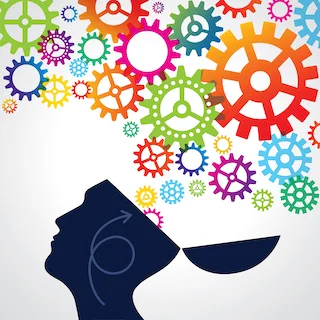Monday, August 19, 2019
welcome to the leADDership brief
A weekly newsletter for creative and innovative people, like you, with ADHD who want timely, helpful, and interesting resources
for leading and living well with ADHD.
I’M LATE
I’M LATE TO A VERY IMPORTANT DATE!
MEETINGS
It happened every Wednesday at 9:00 am CST, it happened in the same room, in the same building, populated by largely the same people for almost two decades: our weekly staff meeting. And yet, it never failed to sneak up on me and I would start almost every Wednesday feeling anxious, unprepared, and already behind the eight-ball. And running to catch up <read: late>.
When I share this with my friends, family, and colleagues they are often surprised. Not that I wasn’t as prepared as I could be for the meeting, rather, the inner struggle I was dealing with. As an achiever, type-A, energetic person I could fool most people, including myself, most days, that I’m good with everything. And, if the topic or meeting was interesting enough, I could stay engaged and wing it mostly successfully.
Like many adults with ADHD I would take a passive, let’s see what happens, I can wing it, anxiety fueled energetic, approach to meetings. In retrospect it wasn’t very efficient or respectful of myself and my colleagues.
As with anything on a calendar or time related, my ADHD brain’s relationship with time was the unknown and unseen issue at hand.
The meeting wasn’t NOW so it was NOT NOW and I didn’t need or or even want to focus on it.
My SHORT TIME HORIZON meant the ship called the “SS Wednesday Meeting” was somewhere out on the distant horizon until it was suddenly docking on the shores of Tuesday evening or Wednesday morning.
Inside Your Brain
There are any number of things we experience before, during, and after a meeting. Below are four of the most common realities of what is going on inside our ADHD brain when it comes to preparing for, attending, and following up to meeting participation.
FAULTY FILTER: People with neurotypical brains have a “gatekeeper” that controls input by filtering out unimportant information, your ADHD brain has little to none. Your brain is taking in everything in the meeting room. Every noise, every color, every smell, every hum, every word, every shadow that passes the window, the tick of the clock on the wall, the click of a pen. Your senses are welcoming in everything around you, nothing is sorted, and everything is labeled “important—pay attention!” This means you often hold onto information that isn’t necessarily critical or important post meeting.
ADHD Pro Tip:
Review the meeting agenda ahead of time. Break down the key points and zero in on the points you want to focus on.Create a zero-focus plan. For me this is a list titled “This is not why I am at this meeting” and jot down interesting but not important ideas, thoughts, and factoids related to this meeting. This list can also contain “confronting issues or people” as I will often default to confrontation in order to relieve stress and anxiety and stating this as an intention keeps me from ramping up a conversation not germane to the meeting. I read it before I go (audio learners can read it out loud) which creates a space in my brain to go to when I want to rabbit trail in the meeting. This also allows me to be agile in the meeting and bring up a timely “out of the box” idea when applicable.
OVERWHELM: because of your lack of a filter you are constantly being bombarded by stimuli which quickly becomes overwhelming to your brain. You don’t know where to focus your attention. There are two common reactions to overwhelm, what I call “over-corrected extroversion” and “over-corrected introversion.”
Outward and extroverted corrections: For those of you who are very social and you turn outward when overstimulated. You gain energy and creativity from the energy around you. You love to talk in a group or meeting and always have a story to tell. Unfortunately, you often miss the cues that tell you not to dominate the discussion. You are unaware of your impulsive interruptions. You had a good idea and were afraid of losing it so you blurt it out. Or you put your foot in our mouth. (If you haven’t figured it out by now this is me :-))Inward and introverted corrections: For some you don’t feel like you fit in and you turn inward when overstimulated. You gain energy and creativity from quiet and contemplative spaces, like the one anywhere outside the meeting. You struggle to keep track of the conversations, have difficulty blocking out unwanted sounds, participate rarely, and end up feeling overwhelmed and unsure of what was said or what is expected as a result of the meeting. You often feel anxious and shut-down in the meeting.
ADHD Pro Tips:
Loads of self-compassion first. Speak kindly and encouragingly to yourself before the meeting. Acknowledge your ADHD brain and all of its glorious strengths and embrace them.
Write affirmations on sticky notes and put them on your notepad.
Schedule 10-minutes of quiet time before the meeting to breath, to review the meeting agenda, and set your personal intention for the meeting.
Give yourself permission to stand up, play with a fidget, or leave the room for a moment if you feel overwhelmed. Create actual physical permission slips if that’s helpful.
FORGETTING: your ADHD brain has difficulty accessing, retrieving, and using memory. This is not a character defect, it is simply a fact of how your brain works. If you’re an adult with ADHD you’ve experienced the frustration others have with us at having to repeat instructions or refocus us. I've lost count of how many times I’ve blurted out, “If I don't say it right now I'll forget.” This isn’t an excuse for impulsively interrupting, it’s a reality and a request for understanding and compassion. If I don’t say it right now I will forget, the folder in my brain will lock up until 2:00 am when it will suddenly open and download ALL the information in that folder including what I wanted to say as well as all the things my inner critic is now yelling at me about regarding that meeting or conversation.
ADHD Pro Tip:
Enlist a supportive colleague. A compassionate and understanding colleague can be a huge help when it comes to staying focused and following through on items discussed in the meeting. Develop a secret signal your colleague can use to help get your attention if your mind wanders or you're getting overwhelmed. Schedule time to meet with that colleague after the meeting for a quick recap and to discuss any lingering questions.
Bring a notebook or legal pad and jot down ideas and thoughts as they come to you. Give yourself permission to hold the thought or idea for a moment before speaking up. Is this a NOW topic or a NOT NOW topic?
If you’re an auditory learner record the meeting so you can review it after the meeting.
PIN-BALL THOUGHTS: The meeting has started and suddenly your brain is overwhelmed and flooded, causing it to short-circuit, you can’t even think straight. You’re not just swimming in your own thoughts, there are so many thoughts there’s no room to swim. The mention of one word or phrase pings another thought in your brain, then another, then another. Your thoughts are like a pinball being batted back and forth from idea to thought, to memory, to a rabbit hole of no return. Or maybe it’s like booting up your computer and suddenly all the tabs and folders open downloading everything at once. You don’t know where to look, what to pay attention to, or what’s important. So you find the one interesting thought and focus there so as to lower anxiety. You can read more in the July 1st, issue of the leADDership brief to learn more about cortisol and overwhelm.
ADHD Pro Tip
I will say this a million times: loads of self-compassion and empathy. Overloaded thoughts is your reality and it isn’t going to change but you can get really good at compassionate self-talk. Bring your list of affirmations and remind yourself that you are NOT ADHD, ADHD is just the way your brain functions. Speak kindly and gently to all those thoughts, acknowledge that they are all good ideas and thoughts but NOW is not the time for most of them.
Bring your NOW-NOT NOW list so you know where to focus your thoughts.
All of those thoughts and ideas have to go somewhere. Keep a running list on a notepad. Doodle or write notes, whatever form works for you.
Keep a small stress ball or fidget in your pocket to squeeze or spin when you notice you are getting overwhelmed
Take a bio-break so you can and leave the room. Breath and re-center your thoughts.
REMEMBER TO HONOR WHO YOU ARE,
WHAT YOU DO BEST, AND HOW YOU DO IT
SELF COMPASSION: put into practice self-compassion exercises like empathic self talk and breathing, and soothing touch. For more on this check out the post from July 15, 2019
HONOR YOUR UNIQUE RELATIONSHIP WITH TIME: Your brain experiences time differently, use your ADHD problem-solving and innovative abilities to develop a system that works for you. Many adults with ADHD find it helpful to determine what time you need to leave for a meeting rather than when you need to be there. For more on this check out the July 12th edition of the leADDership brief.
LEVERAGE YOUR STRENGTHS: If you’re unclear about your strengths and the things you do really well, take the Clifton’s Strength Finder Assessment here. Deepening your understanding of your strengths will help you understand what motivates you so that you can develop a system that works for you. If RESTORATIVE is one of your strengths, spend some time before the meeting considering solutions to agenda issues. If ARRANGER is one of your strengths consider how you might connect all the dots for the meeting participants. For more on this check out the July 30th edition of the leADDership brief.
RESPECT YOUR LEARNING STYLE: If you are an auditory learner ask to record the meeting so you can go back and listen to the meeting content. If you’re a visual learner bring paper and sharpies so you can take notes and doodle. If you need to get up and move around, talk with whoever is leading the meeting and let them know that you think best and participate best when you can pace quietly in the back or on the margins of the room. For more on this check out the July 22nd edition of the leADDership brief.
EMBRACE YOUR COMMUNICATION AND SOCIAL PREFERENCES: How do you interact with your environment? What gives you energy? What depletes you? How do you make decisions? How do you approach work? If you’re an intuitive and global thinker you may find yourself bored by the minutia of meetings. If you’re approach to work is more possibilities and “wing-it” you may frustrate those who want closure and predictability. Know yourself gives you the agility and ability to flex your style in meetings so that you can nail the meeting.
TEN BRIGHT IDEAS FOR MEETING PREPARATION
SO YOU CAN SHOW UP AS YOUR BEST PROFESSIONAL SELF
BRING A WATER BOTTLE: Hydrate your brain, it’s 85% water and depends on sufficient water to function well. More specific to ADHD, water facilitates the production of the neurotransmitters dopamine and nor-epinephrine, which are necessary for better executive function. When your brain has the amount of water it needs you enhance your ability to think clearly, faster and focus better. Without enough water these functions are compromised.
DO SOMETHING PHYSICAL: Doing something physical arouses your brain and encourages dopamine production, helping you focus. Take a brisk walk around the office or up and down the stairs, do jumping-jax, or stretching in your office. Moving your body also helps to reduce pre-meeting anxiety.
MEDITATION AND MUSIC: Five minutes of meditation and/or soothing music will help you center your brain and reduce overwhelm. Research shows that classical music is particularly soothing for your brain. Set your intention for the meeting. Meditate on why you are attending this meeting. How do you want to show up for this meeting? Embrace the strengths you bring to the meeting. I like the Calm app for this. They have a huge menu of options for short meditations and affirmations.
EAT A PROTEIN SNACK: Eat protein-rich foods like almonds or walnuts, string-cheese, Greek yogurt, or a protein shake 10-15 minutes before the meeting. Protein enhances your ability to be more alert and focused, especially at meetings when this is more difficult.
CALENDARS, ALARMS, & REMINDERS: Whatever calendar system works for you use it. Put those meetings on your calendar. I jot down the time I need to leave for the meeting as well as what time the meeting starts. Download my Backing Up Into Time Cheat Sheet. Set alerts and reminders on your phone, watch, and calendar. Keeping your short time-horizon in mind, set alerts and reminders for an hour, thirty minutes, and 15-minutes before you need to LEAVE FOR the meeting, not when you need to be AT the meeting.
TAKE NOTES OR RECORD THE MEETING: Taking notes helps visual and kinesthetic learners stay on track. However, others with ADHD may find that note-taking itself is distracting. Do what works for you. I recommend using colored pens and papers as black ink on white paper is boring and may cause you to lose interest. Color also serves as an organizational aid. Recording the meeting for auditory learners relieves stress and anxiety as you know you can go back and listen to the meeting so as to capture important data points.
ADVANCE PREPARATION: If an agenda or materials are provided prior to the meeting, make sure to read through them carefully or read them out loud to yourself. Make notes, or voice record your notes, about any questions you might have or ideas you want to share. In preparing ahead of time you can avoid the risk of impulsive comments or interruptions.
In the event that materials are not available in advance, check in with colleagues to discuss the topic of the meeting and go over a few ideas to organize your thoughts.
MEETING ALLY: A compassionate and understanding colleague can be a huge help when it comes to staying focused and following through on items discussed in the meeting. Develop a secret signal your colleague can use to help get your attention if your mind wanders or you're getting overwhelmed. Schedule time to meet with that colleague after the meeting for a quick recap and to discuss any lingering questions.
CHOOSE YOUR SEAT: This may require you to arrive early if it’s a new meeting or space. To keep distractions at a minimum, choose a seat away from a window or active doorway. The best spot is in clear view of the main speaker or person leading the meeting.
MEDICATION: If you’re on medication, make sure it covers you for your meeting and beyond.
A free download of my The Sleep Hygiene E-book
is available to
the leADDership brief subscribers
What Else Do You Need To Know?
Coach Pam













